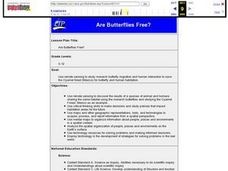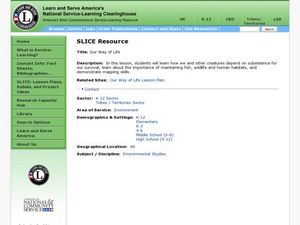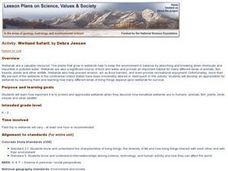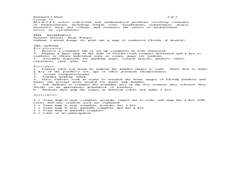Curated OER
That's Not Fair!! Human Rights Violations during the 1800s
Learners explore the migration of African Americans into the Hoosier area. They develop a time line showing migration patterns in Indiana and explore reasons for African Americans to settle and/or travel through Indiana.
Curated OER
Mapping Your Community
Learners define the boundaries of their community by comparing the community's official boundaries with other historical, political, physical, and perceived boundaries of the area and create a community map.
Curated OER
Comparison of hometown life with that of life in a Canadian city
Students research cultural characteristics of a Canadian city with that of their home town. They complete a map handout, providing the relative location on a large map and the absolute location on a provincial map. Students work together...
National Wildlife Federation
I Speak for the Polar Bears!
Climate change and weather extremes impact every species, but this lesson focuses on how these changes effect polar bears. After learning about the animal, scholars create maps of snow-ice coverage and examine the yearly variability and...
Curated OER
Understanding Growth of the Phoenix Area
Students study the growth of the Phoenix area using geographic images, maps, tables, and graphs. They study the idea of community.
Curated OER
Mountain Pine Beetles
Students research and develop power point presentations that answer the question, "What is changing our forests?" In this ecology lesson, students research the niche of Pine Beetles and their increased effect on the forests in Colorado.
Curated OER
Alberta And Saskatchwan: the View in 1905
Students analyze the differences between maps 1905 and current maps of Alberta and Saskatchewan. They use maps from the Canadian Council for Geographic Education to complete a guided inquiry. This lesson also has many extension activities.
Curated OER
Are Butterflies Free?
Students use remote sensing to study monarch butterfly migration and human interaction to save the Oyamel forest (Mexico) for butterfly and human habitation.
Curated OER
What's In a Name?
Students explore the relationship between names and certain cultures and locations. In this identity lesson, students create family migration or immigration maps. Students read excerpts from When My Name was Keoko and Lost Names: Scenes...
NET Foundation for Television
1850-1874 African American Settlers
Go West, young man! Scholars investigate the impact of African American settlers moving to the Nebraska territory, following the passage of the Kansas-Nebraska Act in the mid 1800s. Using primary sources, timelines, maps, and...
Curated OER
Global Awareness
High schoolers read about how scientists are arriving at current theories of human origin and migration through mitochondrial DNA analysis. They then piece together a map showing the data from mitochondrial DNA analysis to plot the...
Curated OER
Taro
Students locate taro growing areas on a map and how it got there, explain intercultural contact and how taro has been adapted in Hawaii and trace human/taro migration to Hawaii.
Curated OER
Our Way of Life
Students interview Native American Elders about animal migration, traditional food gathering, and subsistence. They research endangered animals, draw a game cycle, and create maps of local migration of animals.
Curated OER
City Bound
Fifth graders identify the reasons for people migrating to cities after the Civil War. Using population data, they discover why populations in cities rose while rural populations fell during 1860 to 1900. They discuss the impact a...
Curated OER
Four Ancient River Civilizations
Students explore how the environment shapes man, how man transformed his world, nd how art became part of the human process. The group is divided into clans and their migratory routes developed in the eight lessons of this unit.
Curated OER
Sudan Surprise
Young scholars consider animal migration patterns that have been recently documented in Sudan. They investigate the migratory patterns of animals and discuss how human conflicts and activities affect migratory wildlife populations.
Curated OER
Wetland Safari!
Students identify how humans, fish, plants, birds, insects and other wildlife benefit from wetland environments. They observe a wetland and its inhabitants, draw a migration map that represents how birds use wetlands in traveling long...
Curated OER
Home on the Range
Students use maps and mathematics to determine the appropriate panther population in a given area. In this Florida ecology lesson, students research the area requirements of male and female panther and use a map to help calculate how...
Curated OER
Stranded along the Coast
Pupils plot stranding sites onto a map using latitude and longitude as well as compass directions with respect to coastal features. They identify several species of marine animals that might become stranded; distinguish their...
Curated OER
Urban Planning: Plan a City
Students analyze the concept of urbanization by planning the placement of some of the major urban/suburban features that make up most cities. They arrange the cultural features to benefit the people who live there, and maintain respect...
Curated OER
Where Should We Put a Store?
Students analyze population data. They convert population data into simple density maps to help make decisions about their world. They select the best location for a school store based on population density. They present their maps...
Curated OER
ProjectWILD Aquatic: Migration Headache
Students explore the important factors that affect habitat quality and the associated survival of migratory water bird populations. They discuss an organisms dependency upon a variety of habitats and habitat quality. Students play a game...
Curated OER
Boosting Your Memory
In this memory instructional activity, students learn about three different ways to memorize given information. They make up phrases to help remember lists and they create mental maps to remember terms. They put what they learned to the...
Curated OER
Where is Everybody?
Middle schoolers collect data from different grade levels at their school and develop thematic maps which show population density, and determine how this might affect the school and themselves in the future.

























